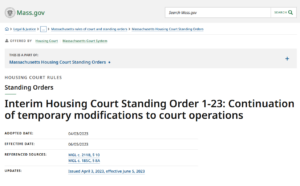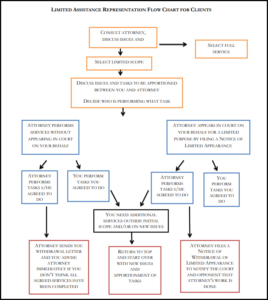Housing Court
In Massachusetts, "housing court" refers to the special set of courts that deal exclusively with housing related matters. This is different from land court, which deals with foreclosure, tax liens, and title. It's also different from district court, which deals with all matters, including crimes and misdemeanors. In housing court, you can file eviction cases and small claims.
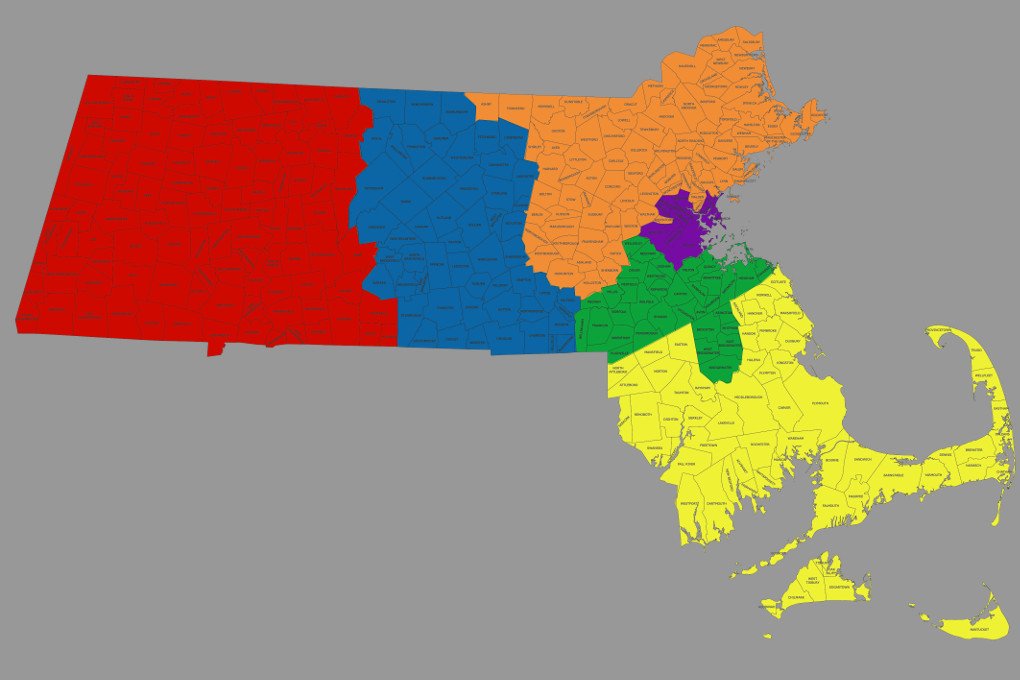
The six Housing Court regions shaded approximately. From left to right: Western Division (red), Central Division (blue), Northeast Division (orange), Metro South Division (green), Southeast Division (yellow) and Eastern Division (purple). CC BY-SA 4 MassLandlords, Inc. derivative of a public domain map.
Jump to
Community Mediation
Massachusetts now requires court mediation as a step in the court’s two-tier eviction process. The Massachusetts Office of Public Collaboration (MOPC) uses state funding to train and supervise volunteer mediators in a different, out-of-court mediation process. Out-of-court mediation is free and may produce better results.
In FY2024, the Mass. Housing Mediation Program, part of the MOPC, oversaw 1,487 mediation cases. HMP surveyed 958 mediation participants:
- 70% of mediated cases reached an agreement;
- 91% of participants surveyed were satisfied with the process; and
- 81% preferred mediation over alternative services.
There are no income eligibility requirements. LLCs, Incs, and other entities do not have to hire an attorney.
Housing Court Introduction
Housing Court has jurisdiction over a variety of housing related matters, including eviction, property damage caused by a tenant, payment plans post-move out, and restraining orders.
Since on or just after Housing Court expansion in July 2017, there have been six housing court divisions covering all of Massachusetts:
- Western
- Central
- Metro South
- Northeast
- Eastern
- Southeast
Housing court shares jurisdiction for eviction and small claims with the District Court. Tenants have a right to transfer cases filed in District Court to Housing Court, which would add delay to your case. Filing in Housing Court also offers two more advantages:
- Mediation can create binding, enforceable agreements without having to go before a judge.
- The Housing Courts specialize in housing matters and are generally knowledgeable and accessible.
That said, an attorney may advise you to file in District Court for your particular case, especially if they are aware of timelines or circumstances that make District Court a more favorable venue for you. Listen to your attorney. If you are a scrupulous landlord, odds are good that you will navigate any court just fine.
Housing Courts Travel
Housing Courts have a primary seat and a circuit. At their primary seat, they tend to hear cases on certain weekdays. For instance, the primary seat of the Central Division is Worcester, so Worcester court day could be a Thursday. But the Central Division also travels to Marlborough (among other places) and hearing day in Marlborough could be another day like Friday. Always file your case at the primary seat of your court, but pay attention to where your case will be heard and on which weekday.

John Adams Courthouse, Boston
For the most updated Housing Court locations and days, click here.
Mediation
Housing Court offers a service called mediation. Before COVID-19, this would take place the morning of your case, when you and your tenant appear in court. Now, it takes place at a mandatory Tier 1 "status hearing." At mediation, you will have the option to sit with a housing specialist to discuss your situation.
You should always choose to do mediation. Mediation has a bad reputation in some circles, but here's the truth:
Mediation is binding.
If a tenant agrees to do something in mediation, it gets recorded by the mediator. The fact of the agreement appears in the official records. Suppose they said they would move out by the 15th. Or maybe they agreed to pay an extra $100/mo to pay back rent. Such agreements are binding on them. You can get what you want without having to appear before the judge.
If you go through mediation and you fail to come to an agreement, you can still see the judge later. And now that you've just been talking to the tenant, you know exactly what they are going to tell the judge. You just heard their whole case. You can now craft rebuttals with your attorney before the hearing date.
Suppose you do mediation, you see the judge, and the tenant doesn't do what they said they would. In that case, it's as if they broke a promise to the court. You can take the tenant back to court, the judge will see you without further mediation, and things will now be very much in your favor.
So always do mediation. You have lots to gain and nothing to lose.
Eviction Records
Court records are increasingly searchable online, going back many years. This means housing court and district court.
Be careful when you search. Landlords might have filed for eviction in housing court or district court for any of the tenant's previous addresses. You also need to try variations on their name to avoid those few records that might have typographical errors.
Court records may also be available at the terminals in the physical housing courts.
Evictions: In the Court Room
Do not expect equal treatment.
Do not expect fairness.
Your job is to make no errors.
Your goal is to regain possession.
You will almost certainly lose money.
- H. John Fisher, HAP Housing, landlording expert
The type of case you have depends on how you filed it. Eviction (aka "summary process") is about breach of agreement. Breach of agreement means unpaid rent or another specific violation. Note that eviction cases do not allow for damages. If you want the tenant to pay you back for damage above and beyond the security deposit, you must file a separate small claims case after eviction. A tenancy at will might also allow eviction without cause.
You should prepare yourself for court by collecting all of your papers and evidence. Courts are public, so if you have time, attend a hearing before your hearing to watch how it works. Ask the court when they are hearing cases and what the procedure is for visitors either on zoom or in person.
If you will be in court for the first time, ask your local landlord network for an attorney. Don't be penny wise, pound foolish: an attorney can save you ten thousand dollars or more. If you are a corporation or LLC, you must have an attorney. If you are a sole proprietor, you should pay for an attorney unless you are confident in your knowledge of the law, and your adherence to all of it.
In the court room, do not lose your cool, and try not to make procedural mistakes. Judges rarely cut landlords any slack. (On the other hand, judges may cut tenants slack.) Remember, you initiated the action, and the judge needs to ensure fairness for the potentially uninformed tenant.
Be honest with yourself; is the real root of your problem the fact that you didn’t do a good job of tenant screening.
- H. John Fisher, HAP Housing, landlording expert
Our Eviction Study showed that, if one party owes money, 99.8% of the time it will be the landlord who gets the judgment in their favor. But that doesn't matter. You will probably not be able to collect the judgment against the tenant. All you can hope for is to get your apartment back and generating income again.
If you want to file for damages above and beyond the security deposit, you can file a separate action in small claims court after you have your apartment back. Whatever judgments you get are good for 20 years. if the tenant starts making real money, or wants to buy a house, this judgment may become collectible.
Just remember that regaining possession of your property is your goal. Keep that in clear focus and set all quibbles and monetary damages aside until you get your apartment back.
Housing Court Remains Understaffed
As of late 2023, the Housing Court had roughly 150 full time equivalent (FTE) staff. Of these 40 FTE were housing specialists (mediators) and six FTE were judges.
The housing court hears approximately 40,000 cases per year. This works out to 1,000 cases per housing specialist or five mediations per day. If all cases were heard by a judge, it would work out to 33 cases per day. You can imagine the difficulty of resolving potentially months or years of nonpayment with very little time. It is best to avoid housing court if possible until and unless it is staffed properly.
See our article on alternatives to eviction.
Central Housing Court Covers Ring, Blacklists, Prepayment and More in Worcester June 2018
On June 13, 2018, officials from the Central Division of the Housing Court, including but not limited to First Justice Diana Horan, Judge Donna Salvidio, and Clerk Magistrate Nickolas Moudios, presented at the Worcester Technical High School. They covered a variety of issues they see owners and managers making. The notes below are intended to be a summary for experienced owners of the new points addressed, rather than a comprehensive review for beginner owners. Any errors are our own.
 Is it Lawful to use the Ring Doorbell System?
Is it Lawful to use the Ring Doorbell System?
A member wanted to know if they could use the Ring doorbell system with its audio and video in their common areas (the stars, hallways, basement , decks, porches and attic) and/or around the perimeter.
Rather than answer specifically, the court staff answered generically: You can't use any system that records audio. It's a criminal offense in MA if there's no consent.
Our take on Ring is that you can use it as a doorbell, without any recording, but you can't use any of the recording features, since they don't separate out video vs audio.
Can I Blacklist a Tenant by Publishing My Eviction Story?
A member wanted to know if they could share their list of bad tenants in print or online.
Court staff said that you can't post tenant recommendations or non-recommendations. Anything you say about a renter must be "crystal clear truth," they said. They said if you want others to know that you had a serious problem with a renter, you should file your case in court and let their name appear in MassCourts.org, and let that public record speak for itself.
You might try to skirt this advice and advertise the public record at MassCourts.org in connection with a renter’s name. “Hey, look at MassCourts.org before you rent to John Doe.” The court staff said that could expose you to claims.
The court staff did not address this, but we want to cite MGL Chapter 93 Section 49, which states in a roundabout way that landlords may be violating the state Fair Debt Collection Practices Act by communicating information about non-payment specifically to anyone other than the courts or the tenant.
Can I Transfer Security Deposits Between Outgoing and Incoming Roommates?
The scenario presented was as follows: Tammy Tenant leaves a roommate situation. Rachel Roommate wants to take Tammy’s place. Can you switch the numbers on the account from Tammy to Rachel, and have Rachel pay Tammy?
The answer from the court officials was pointed: No, you must return the security deposit. You cannot in any way transfer credit to a new renter.
When asked what happens when Tammy cannot be contacted and has left no forwarding address, the court staff advised to leave the money in the bank account for one year.
When asked what happens if the renter is deceased but you have their direct deposit information, the court staff advised against knowingly doing that. Probate or their family should instead be notified that you are holding the deposit and wish to receive instructions.
What’s the Craziest thing Anyone Has Ever Done in Housing Court?
The judges and the clerk magistrate agreed: the craziest thing they’ve seen is anyone who refuses mediation, whether a landlord or a tenant. That’s your last chance to obtain a mutually agreeable and yet legally binding judgment. It’s a chance to avoid being called out for any legal noncompliance. And it’s not a material delay. If you can’t reach a mediated agreement, you can go through the door to see the judge immediately after.
Can I Prepay Rent?
An attendee wanted to know how they were supposed to approve a rental application for a family with substantial assets but no income. The law specifically forbids collecting rent in advance, doesn’t it?
The court officials said the law prohibits requiring rent paid in advance. If there’s a new rental agreement, freely entered into, and the tenant is volunteering to prepay, then that may be permitted. “There cannot be even a whiff of a hint of being required or desired by the landlord,” otherwise it would be unlawful.
Another attendee asked if someone prepays for a year, does that create a rental period of a year? The answer was no, the notice requirement is not changed by prepayment.
The court staff also noted that Chapter 186 Section 15B which regulates prepayments, has one ultimate paragraph that says this restriction shall not apply to rentals of 180 days or less or vacation rentals.
Other Notes
Many judges now feel that the Hatcher case applies to the notice-to-quit as well as the summons and complaint. This means if you are an LLC, you need to have an attorney draft all notices.
The appeals court in Massachusetts have clearly established that homelessness beats economic loss every time. You must show due process to a renter. Don’t expect lost rent or a tied-up unit to sway a judge.
The maximum court-charged late fee is 12% of rent. This is not interest, this is a one-time fee.
What It’s Like Going to Court via Zoom Meeting
By Kimberly Rau, MassLandlords writer
When the COVID pandemic hit in March 2020, Massachusetts initially shut down many of its courtrooms, later reopening them in an online format. And while the state offered tutorials about how to access court service centers online, the prospect seemed daunting. How was one supposed to find out what Zoom meeting ID to use to access the meeting? Could anyone attend a public hearing, like they would be able to in a physical court room?
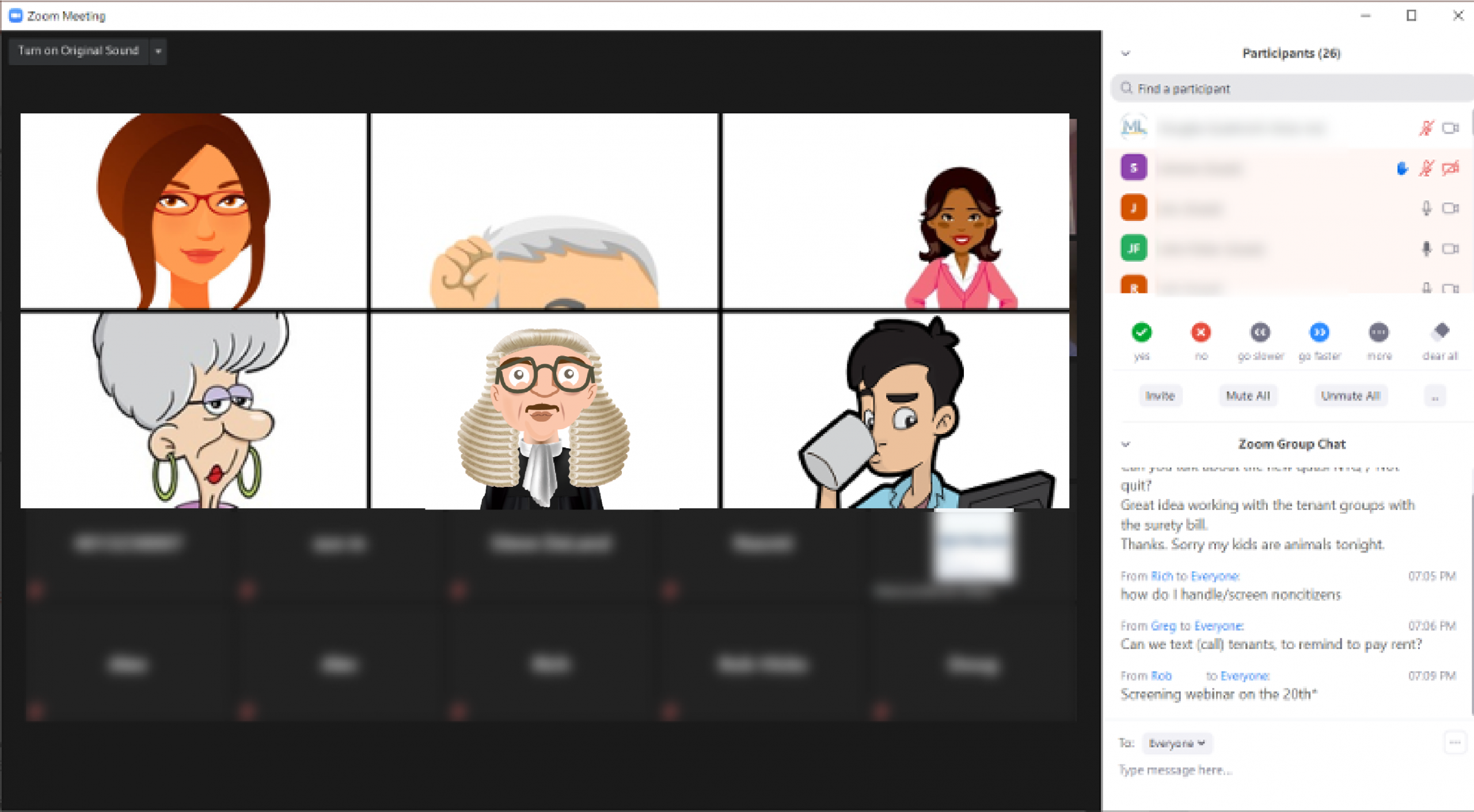
Concerned about attending court online? Fear not; the process to access hearings in Massachusetts is painless.
Image credit: CC BY-SA MassLandlords
In covering one landlord-tenant nonpayment dispute, we had the opportunity to find out.
First, we were pleasantly surprised to discover that finding the correct Zoom “courtroom” was easy. We accessed the case we were following on the Massachusetts electronic court database, searching by the appropriate region and court (in our case, the Southeast housing court) and then first and last name of someone involved in the case (here, plaintiff Dawn McGuire). On the page that had updates for the case, we were able to see when the hearing had been scheduled. That line also had the Zoom ID and password, so, on the correct date, it was a matter of signing in at the right time.
Our reporter Jennifer Rau signed in a few minutes before the hour, providing her real name, and shortly, a court clerk signed in as well to ask if she was a witness for either the plaintiffs or the defendants. Rau said no, identified herself as a representative of MassLandlords, and was told to sit tight while everyone else signed in. The screen went back to a “waiting room” screen until everyone was present. The chat remained open during this time, and a telephone number was provided where someone could phone in and hear the checking-in process if they desired.
Around 15 minutes after the scheduled hearing time, the hearing began. In this instance, it was just the plaintiffs, defendants, judge, clerk and assistant and our reporter present. The clerks did not remain on video during the hearing.
The judge kept the meeting orderly, reminding people to wait their turns to speak, because, just like in person, people trying to talk over one another makes it difficult to hear anything. This is compounded by internet lag time. As in in-person court, evidence was supposed to be submitted ahead of time for the judge to review.
Overall, attending the hearing (and another follow up at a later date) was a simple, painless process. In terms of accessibility, accessing online hearings over a computer is the easiest option, but if you can’t use a computer, you can also dial in (the phone number should be provided along with the meeting ID). At this time, it does not appear as though there is an option to attend a virtual hearing in person. But, if you do not have a smart phone, another option is to see if your local library will allow you to sit in on a Zoom meeting on one of their computers (just bring your headphones).
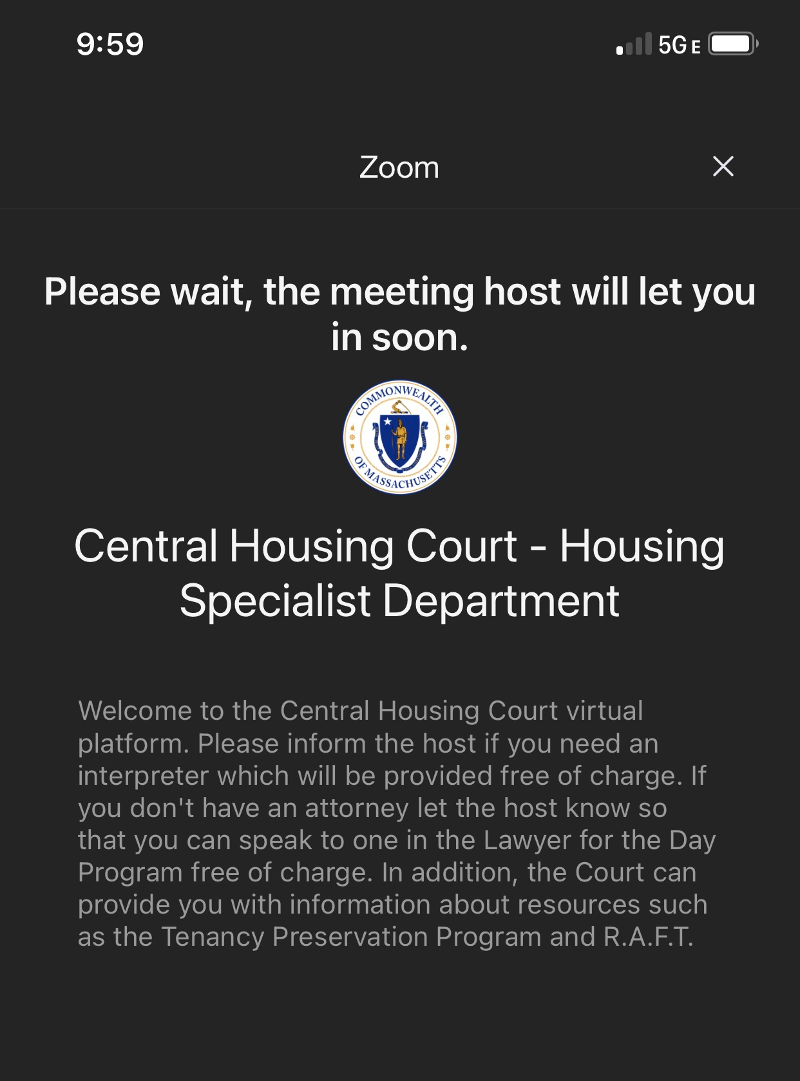
Screenshot of the Housing Court zoom waiting room. Litigants will have access to lawyer for the day and interpreting services, and will be prompted to apply for or at least learn about rental assistance.
History
- First Batch of Eviction Data Released (April 14, 2015)
- Commission wants to expand Housing Court by 50% (April, 2015)
- Security Deposit Violation Delays Eviction (January, 2016)
- Unbelievably Good News About Court Records (February 17, 2015)
- Five New Housing Court Judges Confirmed (August 2018)
- Findings Unfounded: Appeals Court reverses $55K Housing Court Judgment (Lindquist v. Stella)
- Choosing Judges in Massachusetts: The Governor’s Council and Judicial Nominating Commission Then and Now (November 2018)
- Judge Winik Speaks on Landlord-Tenant Law and Housing Policy (March 2019)
- New Housing Court Judge and Clerk Magistrate (June 2019)
External Links
- Housing Court Virtual Counter
- Chapter 257 of the Acts of 2020
- E-File
- Which court house covers which towns?
Past Presentations
To view all of this presentation, you must be logged-in and a member in good standing.
Log in or join today and gain access all presentations and videos
Slides are available only for members in good standing who are logged in.
e-Filing Resources
Members can ask experienced landlords for advice over email and Facebook message boards, and can search our directory for attorney referrals.


